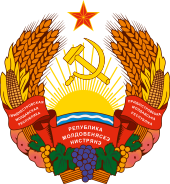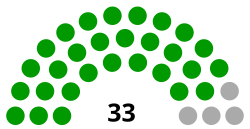Supreme Council (Transnistria)
Supreme Council of the Pridnestrovian Moldavian Republic Верховный Совет Приднестровской Молдавской Республики | |
|---|---|
 | |
| Type | |
| Type | |
| Leadership | |
Speaker | Vadim Krasnoselski, Renewal since 23 December 2015 |
| Structure | |
| Seats | 43 |
 | |
Political groups | Renewal (33) Independents (8) |
| Elections | |
Last election | 29 November 2015 |
| Meeting place | |
 | |
| Tiraspol | |
| Website | |
| http://www.vspmr.org/?Lang=Eng | |
 |
|---|
| Constitution |
The Supreme Council[1] of the Pridnestrovian Moldavian Republic (Template:Lang-ru,[2] Verkhovny Sovet Pridnestrovskoy Moldavskoy Respubliki) is the parliament of Transnistria. The unicameral legislature consists of 43 seats, all of which are determined by single mandate constituencies. It is headed by a chairman (or speaker).
History
Moldova still considers Transnistria part of its territory, although Transnistria declared independence on 2 September 1990. As Transnistria was not autonomous region before declaration of its independence it had no government bodies of its own in the USSR. It meant that all government authorities had to be formed from scratch.
On 2 September 1990 the Second Extraordinary Congress of People's Deputies of all levels of Pridnestrovie elected the Provisional Supreme Council of Pridnestrovie which was tasked to prepare elections in the permanent Supreme Council. Igor Smirnov was elected chairman of Provisional Supreme Council in March 1990. After Smirnov was elected Chairman of the Republic (later this post was transformed into presidential office) on 29 November 1990 he was succeeded by Vladimir Gonchar.[3]
On 25 November 1990 first legislative elections to the Supreme Council of PMR took place in Transnistria. First Supreme Council was bicameral: it consisted of 2 chambers - the Council of the Republic and the Council of Nationalities. The Supreme Council was elected for a 5-year term and consisted of 64 deputies. On 30 January 1991 the Supreme Council elected native-born Transnistrian of Moldavian origin Grigore Mărăcuţă as its chairman.[4]
After referendum in 1995 and adoption of second Constitution of Transnistria composition of the Supreme Council changed. The Council of the Republic was replaced by the Chamber of Legislators and the Council of Nationalities - by the Chamber of Representatives. Second Supreme Council was elected for a 5-year term and consisted of 67 deputies (32 in the lower house and 35 in the upper house). Elections in the second Supreme Council took place on 24 December 1995.[5]
In 2000 amendments were made in the Constitution of PMR leading to new change in organization of the Supreme Council. It became unicameral and consisted of 43 deputies.[6]
Until 2005, the chairman of the parliament was Grigore Mărăcuţă, but following the victory on elections of the opposition party Renewal the new chairman became Renewal party leader Yevgeny Shevchuk.
In 2009 President Igor Smirnov had set up a commission to draft a new constitution. On 22 July 2009, Shevchuk resigned as speaker and was succeeded by Russian-born ethnic Ukrainian Anatoly Kaminski, also from the Renewal party.[7] Shevchuk cited the newly proposed constitution as a major factor as to why he resigned.[8] He defeated both Smirnov and his former colleague Kaminski in the 2011 presidential elections. Following his defeat in the elections Kaminski resigned both as a speaker and as a head of the Renewal party. He was succeeded by Mikhail Burla, ethnic Ukrainian.
Members of parliament
Most of the members of parliament are native-born Transnistrians. According to official PMR data, 22 of the 43 members of the parliament were born on the territory of PMR, while 4 were born in Moldova, 7 were born in Russia, 6 in Ukraine and 4 did not declare.[9]
Latest election
Template:Transnistrian legislative election, 2010
List of speakers
- Igor Smirnov (November 1990)
- Vladimir Gonchar (November 1990–January 1991; Acting)
- Grigore Mărăcuţă (1991–2005)
- Yevgeny Shevchuk (2005–2009)
- Anatoly Kaminski (2009-2012)
- Mikhail Burla (13 June 2012 – 23 December 2015)
- Vadim Krasnoselski (23 December 2015 - current)[10]
References
- ^ Supreme Council of the PMR. Retrieved 8 June 2008
- ^ Верховный Совет Приднестровской Молдавской Республики retrieved 15 Apr 2011
- ^ History of creation and development of the Parliament of the Pridnestrovian Moldavian Republic
- ^ The Supreme Council of PMR, 1990-2010
- ^ The Supreme Council of PMR, 1990-2010
- ^ The Supreme Council of PMR, 1990-2010
- ^ Supreme Council - parliamentary news MPs vote on a resolution accepting the resignation of Parliamentary Speaker Yevgeny Shevchuk. (22 July 2009)
- ^ Yevgeny Shevchuk, "I call on you all to unite to protect our future, where there is the rule of law, the strong people are just, the weak people are protected, and everyone works and maintains stability”.
- ^ Supreme Council of the PMR: Members of Parliament
- ^ #
External links
